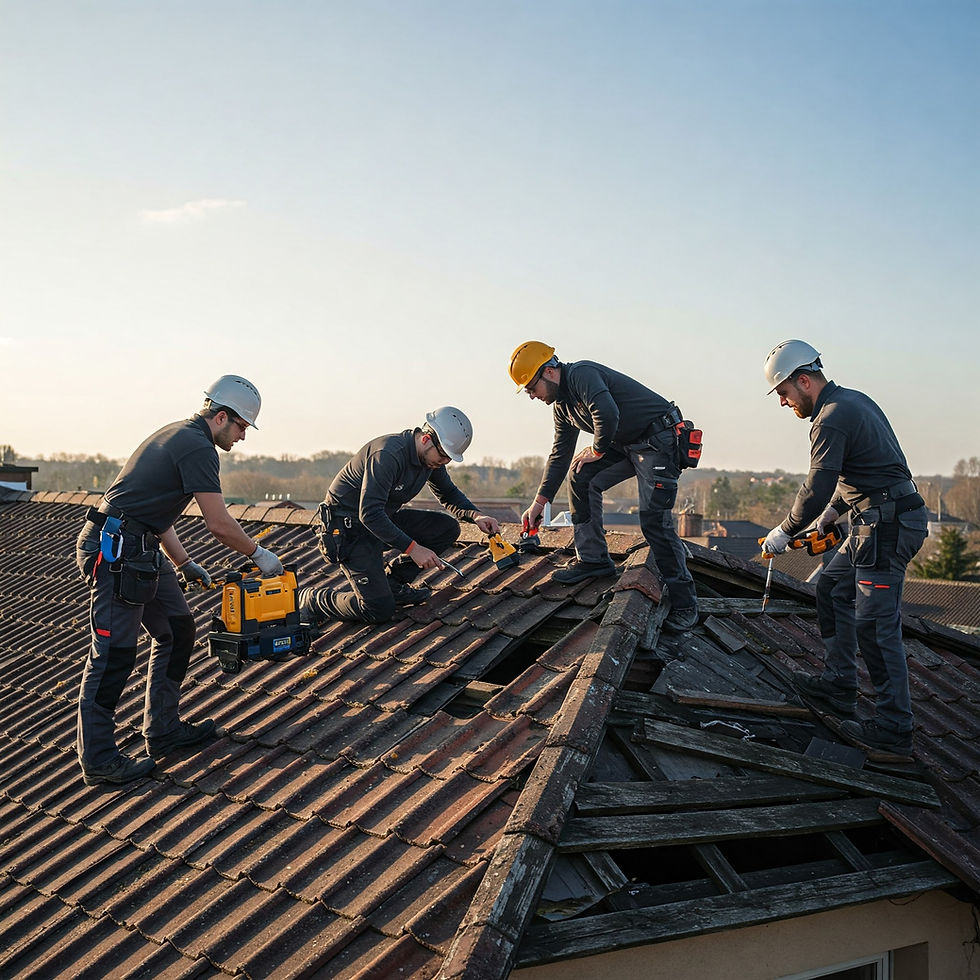A Comprehensive Guide to Selecting the Ideal Contractor for Emergency Roof Repairs and Inspections
- Adam Smith
- May 15
- 4 min read
Updated: Jun 18
A strong roof is crucial for protecting your home. When damage occurs, whether from a storm or general wear and tear, immediate action is necessary. Choosing the right contractor for emergency roof repairs or inspections can make a significant difference in the quality of work and your overall satisfaction. This guide aims to help homeowners navigate the process of selecting a reliable roofing contractor.
Understanding Your Needs
Before diving into your search for a roofer, it's essential to pinpoint your specific needs related to roof repairs or inspections. Different roof types, such as flat and sloped roofs, come with distinct challenges and solutions.
Start by compiling a list of issues you’ve noticed. This could range from leaks or missing shingles to more cosmetic concerns like discoloration or sagging. For instance, if you’ve spotted water damage that resulted in a ceiling stain, it’s important to mention this to potential contractors. Being clear about your needs ensures better communication and helps homeowners determine whether a contractor can handle their specific issues.
Researching Potential Contractors
Finding trustworthy roofing contractors doesn’t have to be stressful. A little research can go a long way toward identifying skilled professionals in your area.
Check Online Reviews: Websites such as Yelp, Google Reviews, and the Better Business Bureau can provide insights into a contractor's reputation. For example, a contractor with an average rating of 4.5 stars and positive feedback about prompt service and quality work is likely a good candidate.
Ask for Recommendations: Speak with friends, family, or neighbors who have recently had roof work done. Personal experiences can provide valuable insights and may lead you to reputable contractors. For example, someone might recommend a contractor who completed a roof replacement on time and under budget.
Verify Credentials: Ensure potential contractors are licensed and insured. In some states, a valid license ensures that the contractor adheres to state regulations, reducing the risk for homeowners. For example, working with an insured contractor protects you from liability if an accident occurs on your property.

Requesting Estimates
After identifying potential roofing contractors, it's time to request estimates. Aim to gather quotes from at least three different roofers for a more comprehensive assessment.
Detailed Proposals: Each estimate should outline the scope of work, materials, labor costs, and expected timelines. Look for precision in these proposals. For instance, a detailed quote may specify the type of materials to be used, such as GAF shingles or specific underlayment, ensuring transparency in the budgeting process.
Discuss Financing Options: If substantial repairs or a complete roof replacement are necessary, explore financing options. Contractors with flexible financing plans can help alleviate financial pressure. Research shows that 50% of homeowners financing their projects value manageable monthly payments.
Assessing Experience and Expertise
Experience counts when selecting a roofing contractor. Make sure to ask contractors about their experience with similar roofing materials and previous projects.
Specialisation: Check if the contractor specialises
in your roof type—this could include flat roofs, tile roofs, or asphalt shingle roofs. For example, a contractor who has worked on multiple flat roofs would have a better understanding of possible drainage issues than one who primarily handles asphalt shingles.
Workmanship Guarantees: Many reputable contractors offer warranties on their work. This provides peace of mind for homeowners, as it indicates the contractor stands behind their workmanship. For instance, a five-year warranty on labor shows confidence in their skills.

Checking References
A reputable roofing contractor should readily provide references from past clients. Take the time to contact these references and ask meaningful questions.
Quality of Work: Inquire if the work was completed on time, met standards, and was finished within budget. For example, you might ask if the project was finished a week ahead of schedule, allowing the homeowner to avoid further weather-related damage.
Communication: Assess how well the contractor communicated throughout the project. Good communication fosters trust and keeps homeowners informed about project updates and any necessary changes. A contractor who regularly checks in and addresses questions can make a significant difference in the process.
Making the Final Decision
After gathering all relevant information, take the time to weigh your options carefully. The decision you make can save you both time and money and prevent future issues.
Trust Your Instincts: When it comes down to it, how comfortable did you feel with the contractor? Trust and open communication are key to a successful contractor-client relationship. If you felt uneasy or not fully informed, it might be time to consider other options.
Sign a Written Contract: Once you've made your choice, ensure you have a signed contract that outlines the specifics—scope of work, timelines, and payment schedules. This protects your interests and sets clear expectations for both parties.
Maintenance and Follow-up
After repairs are completed, maintaining your roof is crucial. Regular inspections can extend its lifespan and prevent future issues.
Schedule Regular Inspections: Consider arranging for periodic roof inspections, especially after severe storms. These can help catch potential problems like broken tiles or loose shingles early, preventing costly repairs down the line. Research indicates that homeowners who conduct regular inspections may extend their roof's life by as much as 15-20%.
Maintain Communication: Keep an open line with your contractor for any minor repairs or maintenance needs that may arise later. A contractor you trust can provide valuable guidance and services when needed.
Final Thoughts
Selecting the right contractor for emergency roof repairs and inspections is a crucial decision that can significantly impact your home. By following the steps in this guide—understanding your needs, researching potential contractors, evaluating their experience, checking references, and maintaining ongoing communication—you can greatly increase your chances of finding a competent and trustworthy roofing contractor.
Remember, a well-maintained roof not only protects your home but also enhances its overall value, making wise decisions a vital aspect of homeownership.


Comments